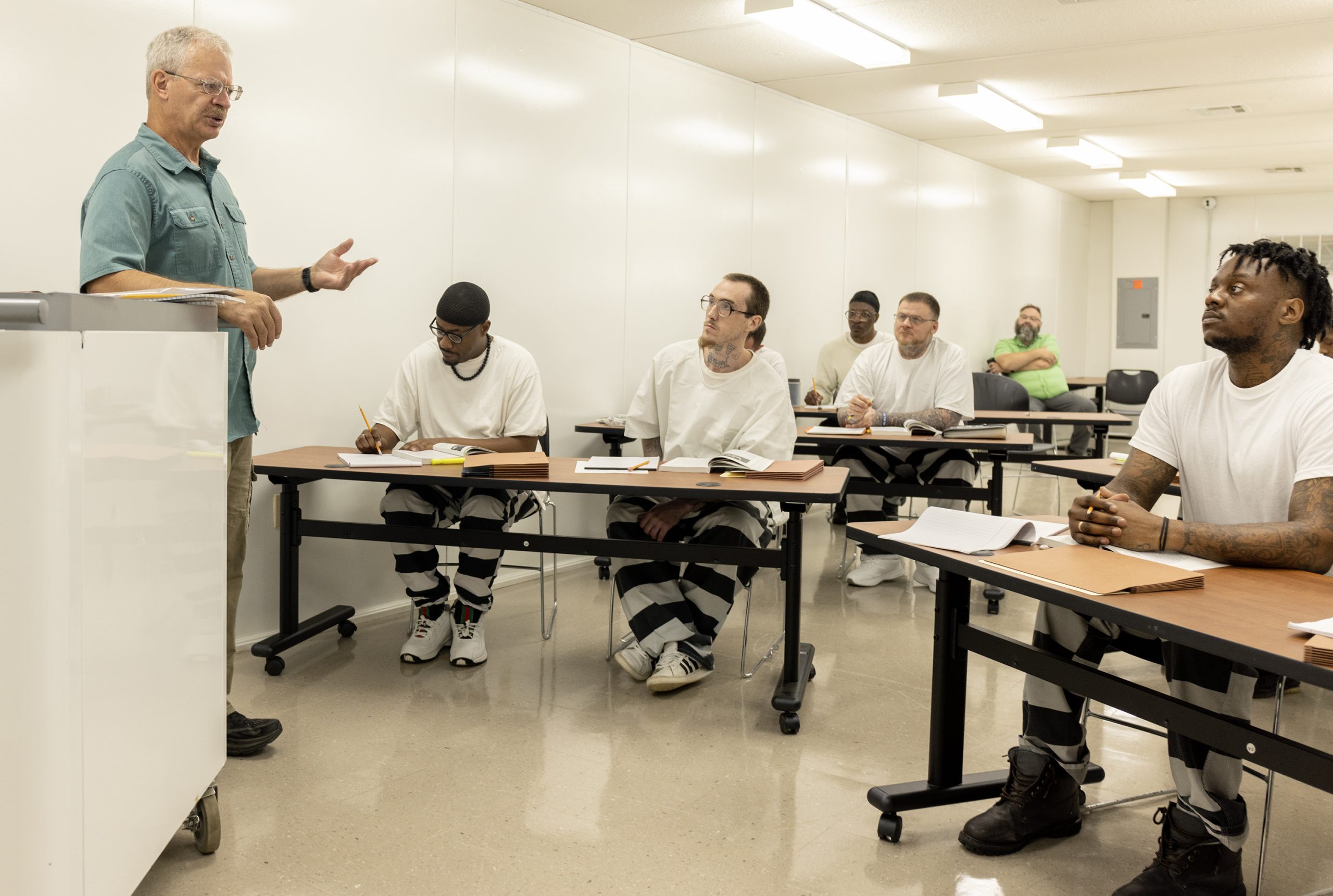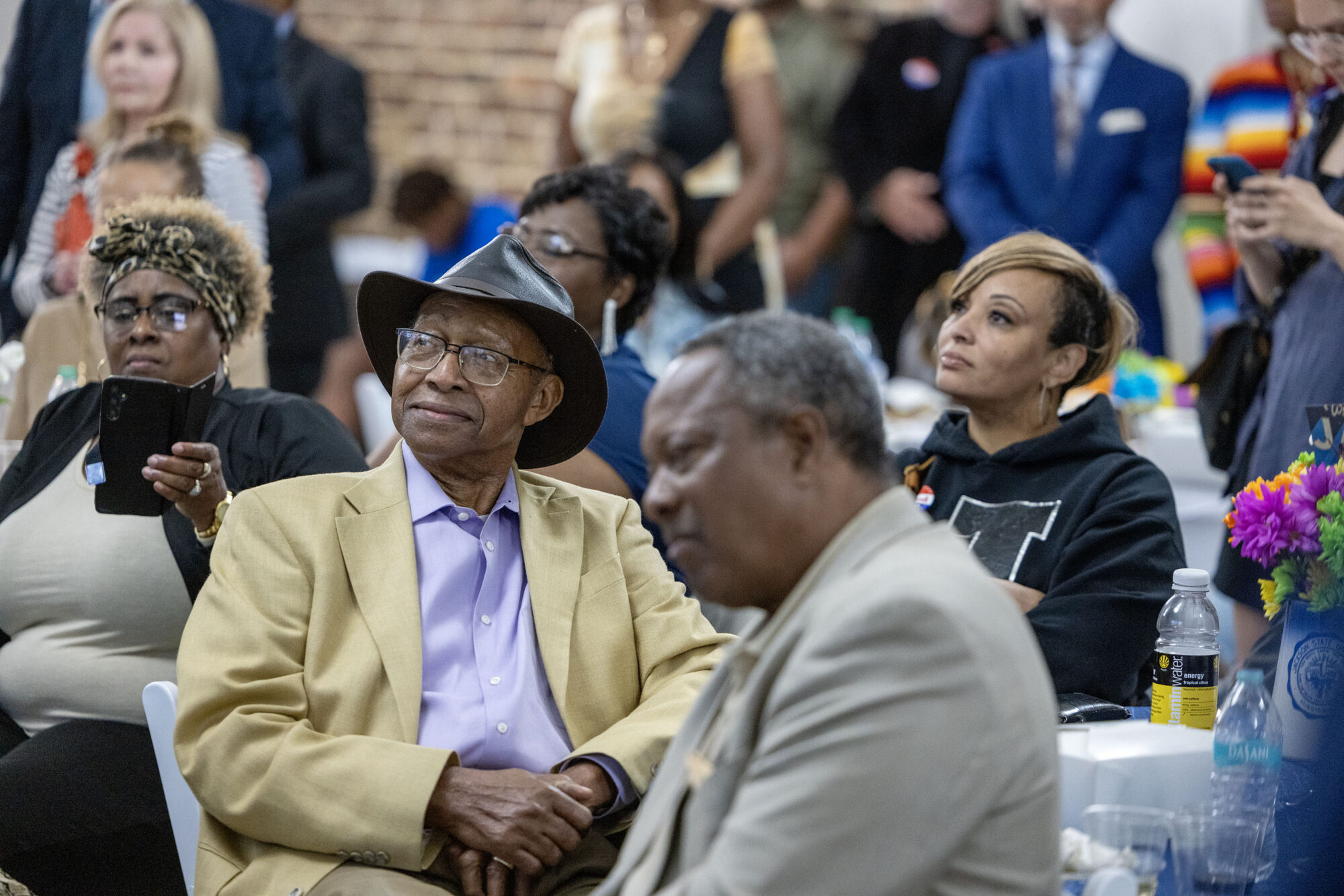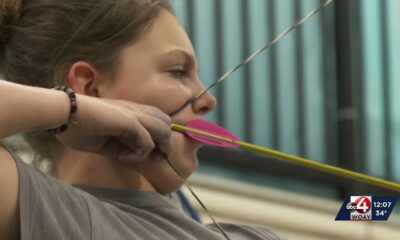Mississippi Today
Prison education programs are primed to take off in Mississippi. Here’s what one class looks like.

CORINTH — In the back of the Alcorn County Correctional Facility, a regional prison in the top-right corner of Mississippi, is an ice-cold trailer.
It’s new. And it’s where Bill Stone — a retired Northeast Mississippi Community College instructor who, for the past three years, has taught a public speaking class at this prison — was headed early Wednesday afternoon.
To get there, he must go through a pat-down. A guard inspects his materials — folders, notebooks and seven copies of the textbook “Practically Speaking.” Then Stone must walk through the prison’s long, loud hallway, past his old classroom; past the canteen, the case managers’ offices and the guard; and past the living pods. Some of his students come to the glass or they shout hello, adding to the din. Finally, after a few steps on a sidewalk walled-off with a chain-link fence, Stone is inside the trailer.
Sometimes, Stone thinks it’s not unlike walking the halls of a high school.
On Wednesday, he had Michelle Baragona, NEMCC’s vice president of instruction, in tow. She’d driven 20 minutes from NEMCC’s main campus in Booneville. Since fall 2017, she has overseen NEMCC’s prison education programs, which are part of a growing movement in Mississippi and across the country. Boosted in part by research that has shown that prison education reduces recidivism, more colleges and universities are offering classes in prison.
Now, as the federal government is preparing to make federal financial aid once again available to incarcerated people starting July 1, these programs are primed to explode in partnership with the Mississippi Department of Corrections. Key stakeholders are on board: In interviews, Burl Cain, the MDOC commissioner, has correctly linked the availability of jobs for formerly incarcerated people, which prison education can help them get, to reduced recidivism.
In the quiet, air-conditioned trailer, Stone was hoping his students could, just for an hour, find some reprieve from prison. Or at least, from their often sweltering hot living pods, which on Wednesday were burning up in the 84-degree heat. All 295 students at this facility can take classes, as long as they have a GED.
“This is much better than the old room,” Stone said. “By a long, long shot.”
He started arranging the desks into three rows.
Around 12:20 p.m., guards brought the students from each living zone until all the desks were filled. They waited quietly for class to start. Some were antsy, tapping their feet or twirling their pencils. One student from the work zone was running behind.
Five minutes later, class started. Stone introduced the assignment. Each student was to talk about three things that interested them. If they talked for more than one minute, they’d get an A.
“At the end, we all clap for them,” he told the class. “Even if they pass out.”
Stone was confident they wouldn’t, but in his 28 years of teaching public speaking, it had happened to two students — it’s always a possibility. So he’d tapped one student to start them off.
“Terrence, I asked you to go first,” Stone said. “Are you ready?”
“Ready as I’m gonna be,” he replied.

There used to be hundreds of college classes just like Stone’s in prisons across the country. Up until the mid-1990s, these programs were considered a key part of doing time — an “opportunity for ‘reformation,’” according to Higher Education in Prison Research. But in 1994, the Crime Bill took away the primary source of funding, which was the Pell Grant, a federal financial aid program for low-income students, by barring incarcerated people from receiving it.
The classes all but disappeared. Now, they’re making a comeback. In Mississippi, colleges and universities across the state are working with MDOC, sheriffs and wardens to set up what are, for many prisons, the first accredited college classes that have been offered in decades. NEMCC had been supporting its programs with private funding, but the Pell Grant will be a game-changer.
This will benefit the whole community, Baragona said. Not only does prison education reduce crime, she said, but families of incarcerated people often move to Alcorn County. They want their loved ones to be able to support the family when they get out.
“We’re not teaching the people who are in there for life,” Baragona said. “These are people who are fixin’ to rejoin society.”
Since 2017, 77 students have taken NEMCC classes at Alcorn County Correctional. The participation rates reflect the institutions’ demographics, Baragona said. Black students made up 57% of participants, and 43% were white — a ratio that was mirrored in Stone’s class, where 7 students were Black and 4 were white.
More than half have taken three or more classes. Two students have taken five classes.
“I don’t want anybody thinking that this is a patsy,” Stone said. “I want these students to write as well, to speak as well as any Northeast student who has come through my traditional classes.”
He poised his finger over the iPad timer as Terrence Glover stepped up to the podium.
“Hello Terrence,” the students said in unison.
Glover talked about how he hates foreign languages (difficult to learn) and loves fishing. Then, 138 seconds later, his speech was over. It was time for the next student. Stone asked for a volunteer. No one moved.
“Anybody that just wants to get it over with right now?” Stone asked.
Carlos White rocked out of his chair. Though he had seemed shy at his desk, he was at ease at the podium. The first thing he was interested in, White said, was TikTok, because it offered access to “a multitude of people from a single device” — that is, to the outside world. He also liked cooking, because it reminded him of his grandmother’s collard greens. His final interest was mentoring. That’s what he wants to do when he gets out.
“So much of the youth go down the wrong road like I did,” he said.
White spoke for 139 seconds, Stone noted. A new record.
The students seemed less anxious and more comfortable sharing. For many, the topic of prison was unavoidable. Another, Vincent Breazeale, talked about the value of education, working and family — three interests, he said, that would “probably be different outside these walls.”
What everyone was really talking about were their dreams, and what they hoped to do when they finally left. One said he’d like to get a dog. Another couldn’t wait to work on cars again. A third student said wanted to start a business manufacturing cologne.
One of the last students to go, Antonio Harris, said that after 19 years of incarceration, he was looking forward to being an entrepreneur when he’s finally released (he’ll become eligible next year).
“I want to be able to work and still kind of like, enjoy life at the same time,” Harris said. “It generates great revenue also.”
By the end, the temperature in the class felt warmer. Stone congratulated the students. This was the first class he’s ever had, he said, where every student talked for more than a minute. He wanted to know how it felt.
“Like riding a bike,” Glover said.
A student named Bruce Parker passed out root-beer-float-flavored candies. He’d used $1.16 of his $20-a-week allowance to pay for a bag.
After a lecture from Stone, it was time for the students to talk to the “navigator.” That is Tina Wilburn. It’s her third day. She’s NEMCC’s eyes and ears in the prison, and it’s her job to advocate for the students. Gripping a prison-issued walkie talkie and a notebook, she wanted to know how they were going to do their homework.
“Are you able to study in the pod where you’re at?” she asked. She’d heard the library was too small.
All the students shook their heads. Dozens of incarcerated people live in each pod and sleep bunk-to-bunk. There’s a lot of distractions.

“It’s extremely difficult,” White said.
Despite everyone’s excitement that day, these students are up against tough odds. They’re unlikely to finish. Last semester, 10 students enrolled, and only two graduated. According to data from NEMCC, the completion rates were higher before COVID, when more career-readiness classes were offered.
Some of the reasons for this have to do with the very nature of prisons, said Ruth Delaney, a program director at the Vera Institute of Justice, a national organization that has been helping prisons set up college classes. For instance, it’s common for incarcerated people to be suddenly transferred for reasons that supersede the class, like a sentencing order that prohibits them from staying in the same prison as a co-defendant.
“A prison is a total institution,” Delaney said. “The minute you cross that threshold, all of your relationships start to feel different.”
If a fight broke out in a students’ living pod, they could be transferred, even if they weren’t participating, she added. That’s more likely to happen during the summer months, when violence in prison rises with the temperature outside. And while some research has shown prisons that have classes become safer over time, the students at Alcorn County Correctional said they had yet to see that happen.
But other reasons can be managed. A huge issue Stone has noticed is dental hygiene. When his incarcerated students’ have cavities, they’re sent to the Mississippi State Prison in Parchman to get teeth pulled. For weeks after, their mouths are too swollen for them to talk in class.
Then there are some students who get demoralized if they do poorly, even on a quiz that doesn’t matter for their final grade.
“It’ll just knock them for a loop, and I’m not used to that,” Stone said. “That’s a definite prison-type thing. A regular college student would go, ‘well, crap.’ They’d just keep on going. For a prison student to make a 40 or a 50, their whole self esteem is locked up in that.”
What makes the difference, Stone added, is support.
All of the students told Wilburn they would be able to finish their homework. Some of them offered tips: The best time to study is around 3 a.m. That’s when the prison is quietest.
The door to the trailer opened. It was a guard. He walked into the middle of the room with his hands on his hips. Everybody turned to look at him.
“I believe they said class is over now,” he said.
So it was.

NEMCC has big dreams for the program. Baragona wants to offer more career-technical programs — classes that are more likely to directly lead to jobs when students are no longer incarcerated. But she’s worried about the logistics of bringing equipment into the prison.
Another issue is giving students computers, which is crucial for learning how to do research. This isn’t possible because they’re not allowed free use of the internet. Stone makes up for that by bringing print-outs of research to class.
Baragona also wants there to be more instructors. Right now, Stone is one of two. Even though society is slowly leaving the tough-on-crime era behind, she still has to “sweet talk” instructors into participating in the program. She was able to convince Stone because, in the early 1980s, he used to minister to a congregant in prison.
And Baragona still hasn’t figured out an efficient way of providing accommodations for students who have disabilities like dyslexia. When the Pell Grant becomes available, she’ll need to set up a system for them to talk to NEMCC’s financial aid office. She’s hoping Wilburn can help with that.
Before class, Baragona asked Stone to tell her if he needed more equipment. A white board would be nice, he mused. Then he thought of something even better.
“A bigger TV would be glorious,” he said. “If someone had an extra 69-inch TV that would be just glorious.”
But right now, the new trailer is enough.
This article first appeared on Mississippi Today and is republished here under a Creative Commons license.
Mississippi Today
Role reversal: Horhn celebrates commanding primary while his expected runoff challenger Mayor Lumumba’s party sours
“Somebody died in here?” asked one of the guests at the glum election watch party.
On Tuesday night, under a dozen supporters of Mayor Chokwe Antar Lumumba sat silently with news reporters on the low couches at a downtown marketing office, watching the results of the Democratic primary that played over muted televisions and fanning themselves in the sweltering heat.
The incumbent had nearly lost the mayoral election outright, earning 17% of the vote compared to Sen. John Horhn’s 48% in the last unofficial count of the night. It was a stacked race of 12 candidates and turnout was low – just 23% of the city’s registered voters participated.
Seven blocks away at The Rookery event venue, Horhn’s watch party was livelier. Around 8:45 p.m., about 100 supporters whooped and cheered as Horhn, his family and his pastor, Bishop Ronnie Crudup Sr., walked into the shiny marbled room.
“That appears to me to almost be a mandate, for one candidate to secure that much percentage of the vote,” Horhn, the state senator of 32 years, said.
The 2025 Democratic primary for Jackson mayor shaped up to be somewhat of a rematch, with the roles reversed this time. After meeting defeat against Lumumba in the same race in 2017, Horhn nearly avoided a runoff in the unofficial count Tuesday, securing 12,318 of the total 25,665 votes. It is his fourth time running for mayor.
“We knew it was gonna be close and had turnout been a little higher, had we worked a little harder, we might’ve been able to get there.”
Unless he receives nearly all of the mail-in absentee and affidavit votes left to be counted, Horhn will face a runoff, likely with Lumumba, on April 22. Lumumba received 4,267 votes. Tim Henderson, a retired Air Force lieutenant colonel known by few at the start of the race, finished close in third with 3,482 votes.
In a speech, Horhn thanked his father, Charlie, his family, members of the Legislative Black Caucus, and his campaign supporters, shouting out many by name, including well-known restaurateur Jeff Good, whose support of Horhn was seized on by some mayoral candidates as a reason to not vote for the state senator.
“You know, a lot has been said by some of my opponents about the fact that we were reaching out across different party lines, racial lines, socioeconomic lines, but everybody wants Jackson to do well,” he said. “And in time, Jackson will be well.”
Good’s support was one reason Horhn’s competitors in the primary tried to paint him as a Trojan Horse for white business interests in the city. He also received endorsements from sitting state representatives and the unions of public sector workers and Jackson firefighters.
“Anyone who thinks that John Horhn is bought by anyone obviously hasn’t seen the depth and breadth of the people that he’s worked for 40 years, and all the endorsements that he has received,” Good said. “The endorsements read like a who’s who of Black leadership. Those are facts. I mean, listen. This is a who’s who room. There’s former supervisors in here, there’s former state senators, current state senators, it’s amazing.”
The accusation is not grounded in a factual understanding of the Legislature, said Rep. Justis Gibbs, D-Jackson, who noted that Horhn is one of 52 senators in a statehouse led by Republicans, not Democrats.
And, Horhn’s district is larger than Jackson, so he has other cities to think about, like Edwards and Pocahontas.
“I think he has done well,” Gibbs said. “I know if I need something done … that I have an advocate, not an adversary.”
Good helped cater the watch party, with Broad Street sandwiches and Sal and Mookie’s pizza. He said he hoped Horhn could continue the vision of former mayor Harvey Johnson Jr. and finally bring a hotel to the downtown convention center, what many hoped would be the starting point of revitalizing the city.
“What was supposed to be the beginning was the end,” he said.
Last year, Lumumba was indicted on federal charges alleging he took bribes in the form of campaign donations from supposed developers of that same property in exchange for moving up a proposal deadline. He pleaded not guilty and his trial is scheduled for 2026.
“I am going to be clear that I am not guilty of any wrongdoing. I am not guilty of any wrongdoing,” Lumumba told reporters after the election results. “I admit that I love this city so much, and I am going to fight relentlessly in order to make sure that everybody gets the quality of life they deserve.”
Lumumba arrived at the Fahrenheit Creative Group office for his watch party, a location change from the luxury bed and breakfast where it was originally planned, a little after 9:30 p.m.. His wife Ebony and their two daughters accompanied him. He chalked up his low performance in the race to misinformation.
“When they tell Republicans to vote in the Democratic primary, we should not be standing here,” Lumumba said, dabbing at his brow. “They gave every reason for us not to be standing here, and yet we are standing here.”
One guest, Amina Scott, said she’s supporting Lumumba no matter what.
“He’s the only option for people in the city of Jackson as a progressive city that’s run by progressive American people,” Scott said.
She points to attempts by the state to take over Jackson Public Schools and the airport.
“It’s not a new concept that has happened in cities across this country where Black people run the cities and states to try to take them back, and they’re doing the same thing to Jackson,” she said.
“…We have to look at our history and understand it’s not a new thing and it’s an old game, and we need to win this time. And the only way we can do that is as a unit.”
Lumumba became mayor in 2017 after winning 55% of more than 34,000 total votes in the Democratic primary against eight challengers, including the incumbent, making a runoff unnecessary. Horhn, who was running for his third time that year, came in second to Lumumba with 21% of the vote. After his first term, Lumumba won reelection after receiving 69% of the vote in the Democratic primary in 2021 with under 20,000 Jacksonians turning out.
The 2025 election saw similarly low voter turnout of under 25,700 votes in the last tally of the night. Mail-in absentee ballots and affidavit ballots are still left to be counted. With all of the issues voters had identifying their correct precinct due to redistricting last year, an election official said they saw a higher number of affidavit ballots – those cast due to irregularities at the polls.
The 2025 election represented a drop in nearly 10,000 votes from 2017, but the city has lost more than that in population during that time.
If Horhn is victorious, his pastor Bishop Ronnie Crudup Sr. said he hopes Horhn can hit the ground running to reverse depopulation in Jackson, which has experienced some of the steepest losses in the country since the last census.
“We’re in a really tough and hurtful place in the city of Jackson right now,” he said. “Years ago, we experienced white flight in Jackson to the suburbs, and now we’re experiencing Black flight. People are feeling hopeless.”
Johnnie Patton, whose family owns the Big Apple Inn, a famous restaurant on downtown’s historic Farish Street, said she wants to see Jackson return to the city she knows it can be.
“We’ve lost a lot,” she said.
Across town at the Jackson Medical Mall, candidate Tim Henderson gathered with members of his family and volunteers around 7:30 p.m. while the election results trickled in.
Henderson, a military consultant who went from little name recognition to finishing third in the primary, said people liked him precisely because he was an outsider, having moved back to the city just two years ago.
“We keep electing the politicians that have been around, and we keep getting the same thing,” he said.
Inside the mall, also a voting location, the poll workers were packing up the precinct. In the center of the mall, empty tables and chairs waited for Henderson’s supporters who were steadily showing up for the watch party. Slow jazz music was playing.
Henderson set up his campaign headquarters here in an office he also uses for his consulting business. Since it was close to a precinct, he had to take down his office signage.
But the retired Air Force lieutenant colonel said he would stand outside the medical mall and talk to potential voters as they walked in, including one woman whose mother was killed in a shooting earlier this year.
“People are tired in this city,” he said.
That was reflected in the city’s anemic turnout, he added. At the medical mall, for instance, officials recorded just 115 official votes from the 541, as of 2024, registered there.
“When people have been in such a depressed and distressed state for so long psychologically it impacts them,” he said.
As he spoke to a reporter in his campaign office, someone called his desk phone. “Please, Mayor Henderson, give me a call back,” they said, but Henderson couldn’t answer it in time.
This article first appeared on Mississippi Today and is republished here under a Creative Commons license.![]()
Mississippi Today
Pharmacy benefit manager reform likely dead
Hotly contested legislation that aimed to increase the transparency and regulation of pharmacy benefit managers appeared dead in the water Tuesday after a lawmaker challenged the bill for a rule violation.
The bill was sent back to conference after Rep. John Hines, D-Greenville, raised a point of order challenging the addition of code sections to the bill, which will likely kill it.
House members in the past have chosen to turn a blind eye to the rule, which would require the added code sections to be removed when the bill is returned to conference. This fatal flaw will make it difficult to revive the legislation.
“It will almost certainly die,” said House Speaker Jason White, who authored the legislation. “And you can celebrate that with your pharmacist when you see them.”
“…This wasn’t ‘gotcha.’ Everybody in this chamber knew that code sections were added, because the attempt was to make 1123 more suitable to all the parties.”
The bill sought to protect patients and independent pharmacists, who have warned that if legislators do not pass a law this year to regulate pharmacy benefit managers, which serve as middlemen in the pharmaceutical industry, some pharmacies may be forced to close. They say that the companies’ low payments and unfair business practices have left them struggling to break even.
The bill underwent several revisions in the House and Senate before reaching its most recent form, which independent pharmacists say has watered the bill down and will not offer them adequate protection.
House Bill 1123, authored by White, originally focused on the transparency of pharmacy benefit managers. The Senate then beefed up the bill by adding provisions barring the companies from steering patients to affiliate pharmacies and prohibiting spread pricing – the practice of paying insurers more for drugs than pharmacists in order to inflate pharmacy benefit managers’ profits.
Independent pharmacists, who have flocked to the Capitol to advocate for reform this session, widely supported the Senate’s version of the bill.
The Senate incorporated several recommendations from the House into its bill, saying that they believed that the legislation would have the House’s support.
Instead, the House sent the bill to conference and requested additional changes, including new language that would eliminate self-funded insurance plans, or health plans in which employers assume the financial risk of covering employees’ health care costs themselves, from a section of the bill that prohibits pharmacy benefit managers from steering patients to specific pharmacies.
This language seeks to satisfy employers, who argue that regulating pharmacy benefit managers’ business practices will lead to higher health insurance costs.
Sen. Rita Parks, R-Corinth, who has spearheaded pharmacy benefit manager reform efforts in the Senate, previously said that adding the language to the bill would “remove any protection out of the law.” But she signed the conference report that included the language Monday after a heated conference meeting between lawmakers.
Rep. Hank Zuber, R-Ocean Springs and co-author of the bill, said the bill has something for everybody, gesturing to its concessions for employers and independent pharmacists. He said the bill gives independent pharmacists 85% of what they wanted.
Mississippi Independent Pharmacies Association director Robert Dozier was not available for comment by the time the story published.
Zuber told House members Tuesday to “blame the Senate” for the slow progress of pharmacy benefit manager reform in Mississippi, citing the body’s failure to take up a drug pricing transparency bill half a decade ago, for three years in a row.
“If the Senate had followed the leadership and the legislation that we drafted those many years ago, we would not be here,” Zuber said. “We would have the information on drug pricing, we would have the information and transparency on (pharmacy benefit managers) and we would have the ultimate reason as to why drug costs continue to rise.”
Members of the House expressed dissatisfaction with the legislation Tuesday, arguing it did not do enough to ensure lower prescription drug costs for consumers.
“I’m going to try to do something next year that goes even further,” Zuber responded.
For the past several years, lawmakers have proposed bills to regulate pharmacy benefit managers, but none have made it as far as this session.
“We’ll go another year,” said White.
This article first appeared on Mississippi Today and is republished here under a Creative Commons license.![]()
Mississippi Today
Feuding GOP lawmakers prepare to leave Jackson without a budget, let governor force them back
After months of bitter Republican political infighting, the Legislature appears likely to end its session Wednesday without passing a $7 billion budget to fund state agencies, potentially threatening a government shutdown if they don’t come back and adopt one by June 30.
After the House adjourned Tuesday night, Speaker Jason White said he had presented the Senate with a final offer to extend the session, which would give the two chambers more time to negotiate a budget. As for now, the 100 or so bills that make up the state budget are dead.
The Senate leadership was expected to meet and consider the offer Tuesday evening, White said. But numerous senators both Republican and Democrat said they would oppose such a parliamentary resolution, and Lt. Gov. Delbert Hosemann has also said it’s unlikely and that the governor will have to force lawmakers back into special session.
White said he believes, if the Senate would agree to extend the session and restart negotiations, lawmakers could pass a budget and end the 2025 session by Sunday, only a few days later than planned.
But if the Senate chooses not to pass a resolution extending the session, White said the House would end the session on Wednesday.
It would take a two-thirds vote of support in both chambers to suspend the rules and extend the session. The Senate opposition appears to be enough to prevent that.
Still, the speaker said he believes Lt. Gov. Delbert Hosemann and Senate leaders are considering the proposal. But he said if he doesn’t hear a positive response by Wednesday, the House will adjourn and wait for Gov. Tate Reeves to call a special session at a later date.
“We are open to (extending the session), but we will not stay here until Sunday waiting around to see if they might do it,” White said.
White said leaving the Capitol without a budget and punting the issue to a special session might not cool tensions between the chambers, as some lawmakers hope.
“I think when you leave here and you end up in a special session, some folks say, ‘Well everybody that’s upset will cool down by then.’ They may, or it may get worse. It may shine a different and specific light on some of the things in this budget and the differences in the House and Senate,” White said. “Whereas, I think everybody now is in the legislative mode, and we might get there.”
The Mississippi Constitution does not grant the governor much power, but if Gov. Tate Reeves calls lawmakers into a special session, he gets to set the specific legislative agenda — not lawmakers.
White said the governor could potentially use his executive authority to direct lawmakers to take up other bills, such as those related to education, before getting to the budget.
“When we leave here without a budget, it is entirely the governor’s prerogative to when he (sets a special session) and how he does that.”
While the future of the state’s budget hangs in the balance, lawmakers have spent the remaining days of their regular session trying to pass the few remaining bills that remained alive on their calendars.
House approves DEI ban, Senate could follow suit on Wednesday
The House on Tuesday passed a proposal to ban diversity, equity and inclusion programs from public schools, and both chambers approved a measure to establish a form of early voting.
The House approved a conference report compromise to ban DEI programs and a list of “divisive concepts” from K-12 schools, community colleges and universities. If the Senate follows suit, Mississippi would join a number of other Republican-controlled states and President Donald Trump, who has made rooting DEI out of the federal government one of his top priorities.
The agreement between the Republican-dominated chambers follows hours of heated debate in which Democrats, all almost of whom are Black, excoriated the legislation as a setback in the long struggle to make Mississippi a fairer place for minorities. Legislative Republicans argued the legislation will elevate merit in education and remove from school settings “divisive concepts” that exacerbate divisions among different identity groups.
The concepts that will be rooted out from curricula include the idea that gender identity can be a “subjective sense of self, disconnected from biological reality.” The move reflects another effort to align with the Trump administration, which has declared via executive order that there are only two sexes.
The House and Senate disagreed on how to enforce the act, but ultimately settled on an agreement that would empower students, faculty members and contractors to sue schools for violating the law, but only after they go through an internal campus review process that would give schools time to make changes. The legislation could also withhold state funds from schools that don’t comply.
Legislature sends ‘early voting lite’ bill to governor
The Legislature also overwhelmingly passed a proposal to establish a watered down version of early voting, though the legislation is titled “in-person excused voting,” and not early voting.
The proposal establishes 22 days of in-person voting before Election Day that requires voters to go to the circuit clerk’s office or another location county officials have designated as a secure early voting facility, such as a courtroom or a board of supervisors meeting room.
To cast an early vote, someone must present a valid form of photo ID and list one of about 15 legal excuses to vote before Election Day. The excuses, however, are broad and would, in theory, allow many people to cast early ballots.
Examples of valid excuses are voters expecting to work on Election Day, being at least 65 years old, being currently enrolled in college or potentially travelling outside of their county on Election Day.
Since most eligible voters either work, go to college or are older than 65 years of age, these excuses would apply to almost everyone.
“Even though this isn’t early voting as we saw originally, it makes this more convenient for hard working Mississippians to go by their clerks’ office and vote in person after showing an ID 22 days prior to an election,” Senate Elections Chairman Jeremy England said.
Republican Gov. Tate Reeves opposes early voting, so it’s unclear if he would sign the measure into law or veto it.
Both chambers are expected to gavel at 10 a.m. on Wednesday to debate the final items on their agenda.
This article first appeared on Mississippi Today and is republished here under a Creative Commons license.
-

 News from the South - Florida News Feed7 days ago
News from the South - Florida News Feed7 days agoFamily mourns death of 10-year-old Xavier Williams
-

 News from the South - Alabama News Feed6 days ago
News from the South - Alabama News Feed6 days agoSevere storms will impact Alabama this weekend. Damaging winds, hail, and a tornado threat are al…
-

 News from the South - Alabama News Feed5 days ago
News from the South - Alabama News Feed5 days agoUniversity of Alabama student detained by ICE moved to Louisiana
-

 News from the South - Oklahoma News Feed4 days ago
News from the South - Oklahoma News Feed4 days agoTornado watch, severe thunderstorm warnings issued for Oklahoma
-

 News from the South - Louisiana News Feed7 days ago
News from the South - Louisiana News Feed7 days agoSeafood testers find Shreveport restaurants deceiving customers with foreign shrimp
-

 News from the South - West Virginia News Feed7 days ago
News from the South - West Virginia News Feed7 days agoRoane County Schools installing security film on windows to protect students
-

 News from the South - Virginia News Feed5 days ago
News from the South - Virginia News Feed5 days agoYoungkin removes Ellis, appoints Cuccinelli to UVa board | Virginia
-

 News from the South - West Virginia News Feed7 days ago
News from the South - West Virginia News Feed7 days agoStudents in Monroe County Schools are ready to shoot their way to the WV State Archery Championships






























































